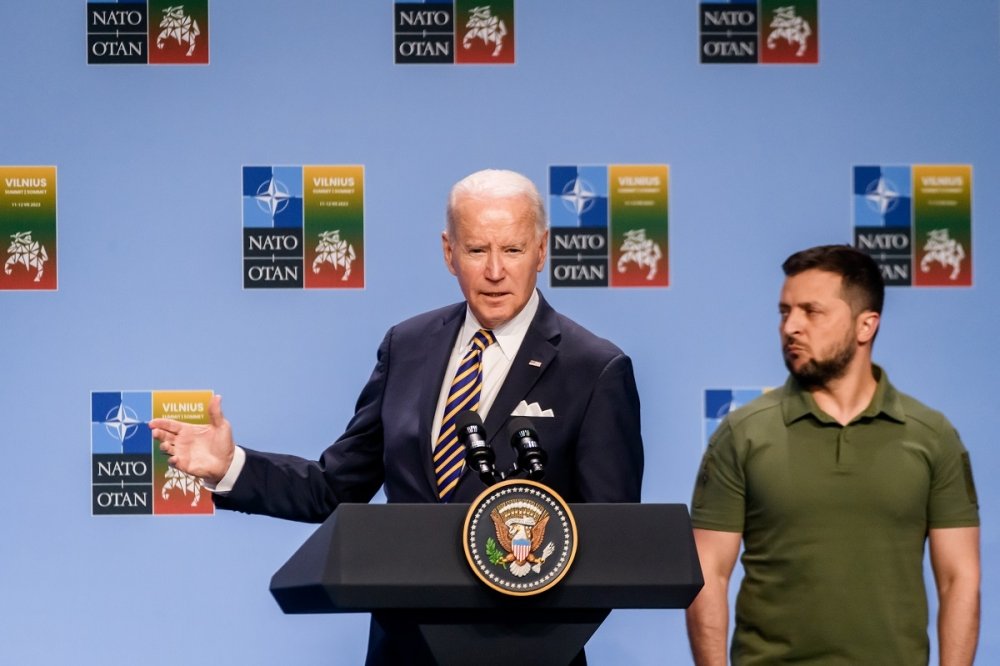
A blog of the Kennan Institute
The US Ukraine Assistance Package Approved: Reactions from Ukraine

Yesterday, President Biden signed into law the long-awaited Ukraine Security Supplemental Appropriations Act. The debates over assistance for Ukraine have gone on since September 2023, with the Ukrainian aid package seemingly hostage to the American domestic agenda. In Ukraine, the delay in deciding on further aid was long seen as America “phasing out” of the European theater of war. The lack of reliable, timely military and financial assistance led to an arms deficit in the Ukrainian Armed Forces (UAF) and, even more painful, a deficit of trust in the West.
Now that the act has been signed into law, the security and political situation in Ukraine will soon change. But how exactly will the infusion of aid influence the sociopolitical, economic, and military situation in Ukraine? Mykhailo Minakov posed this question to Kennan’s Focus Ukraine regular contributors—a politician, a journalist, a UAF officer, and an economist. Here are their answers.
Halyna Yanchenko
The new US aid package is critically important to Ukrainian frontline operations, both in terms of material support and as a morale boost for our soldiers. Regrettably, the six-month delay in passing an aid bill had negative consequences for us as the Russian forces managed to occupy some Ukrainian villages and towns during this time. Moreover, the lack of ammunition for air defense in March and April 2024 meant the Russian forces could conduct massive shelling of defenseless energy infrastructure facilities, with significant knock-on effects.
The United States is a key partner for Ukraine and has the weapons critically necessary for Ukraine’s security. The new aid package is a signal that our allies continue to support Ukraine.
Direct budgetary support, which the act provides in the amount of $7.85 billion, is also hugely important for Ukraine’s budgetary stability.
In responding to this good news, I would like to add some strategic points. We have seen how consideration of the aid package was enmeshed in drama over the last several months. In the future, I think, Ukraine and the United States could probably expand the format of mutual cooperation. One of these cooperative formats could take the form of joint Ukrainian-American defense projects and the production of defense products directly in Ukraine.
Ukraine’s military-related industries are developing very rapidly. In 2023, this economic sector contributed 1.5 percent to the growth of the Ukrainian economy. Also last year the United States and Ukraine signed a declaration on joint arms production, including the production of hybrid air defense systems under the FrankenSAM program. This project is already being implemented in 2024. A special interagency working group, the Ukraine Deal Team, has been established to boost this cooperation.
To scale up defense projects, the Ukrainian military-industrial sector needs American investments. The future of US-Ukraine military cooperation may move, in part, into the private sphere, where American businesses may find attractive opportunities for investment. For these businesses, private sector investment would represent an opportunity to enter an innovative environment and invest in cost-effective projects, while for Ukraine it would provide the UAF with needed defense products much faster and cheaper, as well as create new businesses and jobs.
Katerina Sergatskova
I view the passage of the long-awaited US assistance package for Ukraine as putting out a fire, not solving the issue of Russia’s aggression. Ukraine sorely needed such an aid package six months ago.
Nonetheless, adoption of the U.S. assistance bill will raise the mood among the Ukrainian leadership and society. The strong show of support from the United States is also expected to strengthen the resolve of all those partners and allies of Ukraine that are investing in Ukraine's victory in the war.
The situation at the front is very difficult now. Because of Ukraine’s lack of weapons, especially air defense systems, in recent months the Russian army has been successful in firing more ballistic missiles that have hit peaceful Ukrainian cities and critical infrastructure, including railways and energy facilities.
I hope this step from the United States means that Americans and Ukrainians are on the same page in this war. In Ukraine, we need permanent, predictable aid from our partners, which means a stable supply of weapons and humanitarian and financial aid. The haphazard approach to providing aid to Ukraine makes us too vulnerable to Russian hybrid attacks and hampers our efforts to systematically counteract Russia and protect civilians across the country.
Victor Andrusiv
The delay in providing military assistance has caused enormous damage to the military campaign in Ukraine and its chances of being victorious. Now that the decision has been made in Washington, it is important to recognize the negative consequences of that delay as they have played out over the past few months.
The UAF suffered significant losses, and the troops were exhausted by constant fighting. In the absence of ammunition and air defense systems, the Ukrainian infantry bore the brunt of the fighting. The new package of assistance should address this issue.
Another negative consequence of the delay was the demoralization of Ukrainian society. This has caused significant damage with respect to the mobilization of society and the level of trust in the military and political leadership. At the same time, the Russians have tasted military success and are much more motivated to continue fighting. I hope the US assistance package can help us reverse this process.
Once Ukraine receives the US military assistance, however, there will be no quick changes on the battlefield. Obviously, this support is a strong positive signal for Ukrainians and will help slow the pace of the Russian advance, perhaps stop it. But tangible results will come only with time, as the negative consequences of the delay in aid cannot be overcome overnight.
Andrian Prokip
Funding under the approved bill should help Kyiv address not only defense needs but also urgent economic issues.
First, Ukraine needs to address the serious damage to its energy infrastructure resulting from the Russian attacks in March and April of this year. One of the country’s largest thermal power plants, the Trypillia Thermal Power Plant, was completely destroyed because, as President Zelensky explained, there were zero missiles left to protect it. Ukrainian industry and businesses, especially those on the left bank of the Dnipro, are already experiencing problems from restrictions on the electricity supply.
Electricity is a super-resource without which neither the front nor the rear can act efficiently. Ukraine’s economy directly depends on the ability to protect its energy infrastructure. And the new US military aid package, which includes new air defense systems, ensures that hits on Ukraine’s energy infrastructure will decrease—or stop altogether.
Second, the US aid strengthens Ukrainians’ hope of successfully defending Kharkiv against the expected Russian offensive and against the unceasing bombing of this city and nearby towns. If the defense of Kharkiv improves, industries in this very developed region could restart operations. The same goes for other regions, such as Dnipropetrovsk, Poltava, and Odesa oblasts, where Ukraine’s primary gas and coal production is located. If these regions are better defended, the resulting improved operations of their industries should help stave off threats to the country’s energy sector.
In general, the US aid package is a source of reassurance to people living in the big cities near the front line—the frequent targets of attacks. These cities’ residents have slowly relocated to the rear regions of Ukraine, and local businesses are operating in a climate of growing uncertainty. Approval of the US aid package should strengthen Ukrainians’ confidence in continuing to do business and go on living in eastern Ukraine.
The opinions expressed in this article are those solely of the authors and do not reflect the views of the Kennan Institute.
See our newest content first.
Subscribe to receive the latest analysis from Focus Ukraine
About the Authors

Mykhailo Minakov

Halyna Yanchenko

Katerina Sergatskova

Victor Andrusiv

Andrian Prokip
Director, Energy Program, Ukrainian Institute for the Future

Kennan Institute
The Kennan Institute is the premier US center for advanced research on Eurasia and the oldest and largest regional program at the Woodrow Wilson International Center for Scholars. The Kennan Institute is committed to improving American understanding of Russia, Ukraine, Central Asia, the South Caucasus, and the surrounding region though research and exchange. Read more












